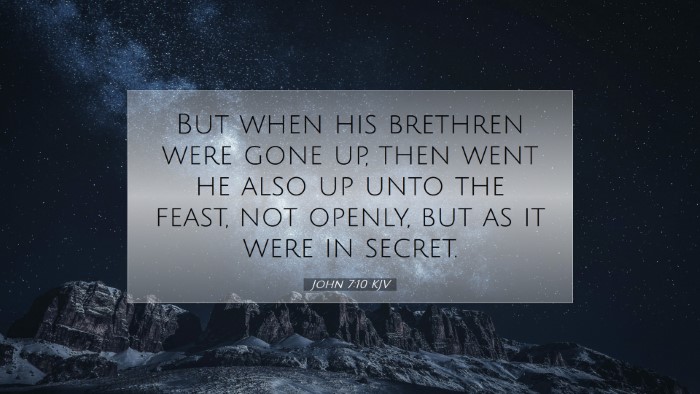Commentary on John 7:10
John 7:10 states: “But when his brethren were gone up, then went he also up unto the feast, not openly, but as it were in secret.” This verse forms a critical juncture in the narrative of Jesus' ministry, highlighting both the tension surrounding His identity and the broader implications of His mission. This commentary synthesizes insights from prominent public domain sources, enriching a deeper understanding of this passage for pastors, students, theologians, and scholars.
Contextual Analysis
The surrounding narrative in the Gospel of John points towards the Feast of Tabernacles, an essential Jewish festival that celebrates God’s provision. The secrecy with which Jesus ascends to the feast is significant, indicating the growing animosity from the Jewish authorities and the divided opinions among the people.
Historical Background
The Feast of Tabernacles, also known as Sukkot, commemorates the Israelites' journey through the wilderness. It’s a time of great celebration and pilgrimage, where many Jews would ascend to Jerusalem. As noted by Albert Barnes, Jesus’ decision to attend the feast privately reflects His understanding of the risks involved due to the hostile environment.
The Significance of “His Brethren”
The term “brethren” here refers to Jesus’ siblings, who likely did not yet fully understand or believe in His divinity. Matthew Henry points out that their lack of belief must have added to Jesus’ burden during this time, showcasing the familial tensions that arose from His messianic mission.
The Relationship Dynamics
Jesus’ relationship with His brothers illustrates a profound theme of faith and family dynamics. Adam Clarke emphasizes that while they were physical kin, their spiritual kinship was lacking. This illustrates the broader principle that true relationship with Christ transcends biological ties.
- Faith vs. Unbelief: Jesus’ brothers were still grappling with the implications of His identity.
- Divine Mission: Their initial skepticism stands in contrast to His divine purpose, underlining the tension between earthly relationships and spiritual callings.
The Aspect of Secrecy
Jesus’ choice to go to the feast “as it were in secret” demonstrates His awareness of the challenges that lie ahead. As noted by Albert Barnes, this decision underscores the notion that Jesus operated under divine timing rather than human expectations.
Understanding Secrecy
Secrecy can symbolize various themes within Scripture, including:
- Divine Timing: Jesus operated according to God's schedule, aligning with the divine plan rather than seeking public affirmation.
- Protection: By approaching the feast cautiously, Jesus protects Himself from the hostile forces seeking to undermine His ministry.
- Revelation of Truth: The quietness of His arrival serves to teach that the manifestation of truth can often come unexpectedly.
Theological Implications
John 7:10 lays the groundwork for understanding several key theological themes:
- The Nature of Christ: Jesus embodies both humanity and divinity, navigating complex human interactions while fulfilling His divine mission.
- Discipleship: This moment encourages reflections on what it means to follow Christ, particularly when familial or societal expectations conflict with faith commitments.
- Timing and Purpose: The timing of events in Jesus’ life reflects a divine orchestration that challenges believers to trust in God’s perfect timing.
Conclusion
John 7:10 offers a poignant glimpse into the intricacies surrounding Jesus’ life and ministry. The interactions with His brothers, the decision to move in secrecy, and the broader implications of His actions call for a reflective approach to understanding His journey. As pastors, theologians, and students engage with this text, it provides a framework to unpack the complexities of faith in the face of familial skepticism, the tension between human authority and divine calling, and the significance of divine timing in the journey of discipleship.
In conclusion, this passage serves as a rich resource for exploration and dialogue, inviting us into a deeper relationship with the profoundly mysterious and yet intimately personal Jesus.


